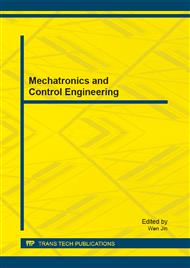p.323
p.329
p.333
p.341
p.349
p.355
p.361
p.366
p.372
A Recursive Gradient Method of Least Square Support Vector Machine and its Application
Abstract:
Least Square Support Vector Machine (LS-SVM) is an important machine of Support Vector Machine (SVM). But this method can not be used for online identification, and maybe lead to calculation inflation. A gradient recursive method of LS-SVM is presented by combining the LS-SVM method with the gradient method. This method can overcome the influence of bad data to the parameter estimation, has a stronger robustness, and improves the calculation speed of LS-SVM. The presented method is applied to the modeling of chaotic series. The simulation example validates the validity of the presented method.
Info:
Periodical:
Pages:
349-354
DOI:
Citation:
Online since:
July 2013
Authors:
Keywords:
Price:
Сopyright:
© 2013 Trans Tech Publications Ltd. All Rights Reserved
Share:
Citation:


